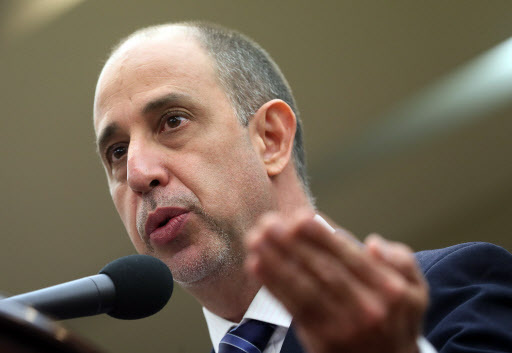[Newsmaker] Some North Korean restaurant workers ‘victims’ of defection scam: UN official
By Ock Hyun-juPublished : July 10, 2018 - 16:05
The UN special rapporteur on human rights in North Korea on Tuesday called on the South Korean government to conduct a thorough and independent investigation into the defection of North Korean restaurant workers in 2016, saying some of the workers were “victims” of a scam.
The government should hold accountable those responsible for what he said could constitute a “crime” and allow the workers to decide whether to remain in South Korea or return to North Korea, Tomas Ojea Quintana said at a press conference in Seoul.
“In regards to those who talked to me, it is clear that there were some shortcomings in regards to how they were brought to South Korea,” Quintana said, referring to some of the restaurant workers who defected to South Korea in April 2016.
“From the information I received from some of them, they were taken to the Republic of Korea without knowing they were coming here.”
Pyongyang has demanded the repatriation of 12 North Korean restaurant workers, claiming they were abducted by South Korean authorities in China. Seoul maintains they defected to South Korea of their own free will.
Controversy resurfaced after local broadcaster JTBC in May aired an interview with the restaurant manager who defected to the South with the female employees. During the interview, he said he had tricked them into traveling to South Korea and the South’s National Intelligence Service had orchestrated their defection.
The government should hold accountable those responsible for what he said could constitute a “crime” and allow the workers to decide whether to remain in South Korea or return to North Korea, Tomas Ojea Quintana said at a press conference in Seoul.
“In regards to those who talked to me, it is clear that there were some shortcomings in regards to how they were brought to South Korea,” Quintana said, referring to some of the restaurant workers who defected to South Korea in April 2016.
“From the information I received from some of them, they were taken to the Republic of Korea without knowing they were coming here.”
Pyongyang has demanded the repatriation of 12 North Korean restaurant workers, claiming they were abducted by South Korean authorities in China. Seoul maintains they defected to South Korea of their own free will.
Controversy resurfaced after local broadcaster JTBC in May aired an interview with the restaurant manager who defected to the South with the female employees. During the interview, he said he had tricked them into traveling to South Korea and the South’s National Intelligence Service had orchestrated their defection.

“My recommendation is to carry out rapid investigation to clear up the facts on what happened and hold accountable those who are responsible,” he said, noting that it could be considered a crime if the workers were taken against their will from China.
Quintana was in South Korea on a week-long mission to meet with government officials, activists, North Korean defectors as well as some of the restaurant workers to gather information for his regular report to the UN General Assembly in October.
Quintana advised the South Korean government to respect the restaurant workers’ rights as “victims.”
“When I say victims, I am implying that they were subject to some kind of deceit in regard to where they were going,” he said. “It is not for the UN, not for the Republic of Korea or the Democratic People’s Republic of Korea to have a say in this regard.”
Regarding Kim Ryon-hui, a North Korean defector who claims she had been forcibly held in South Korea since 2011 and demands to be repatriated to the North, Quintana said it is a difficult case because South Korea has its own laws.
“In any case, at the end, it will be a decision based on humanitarian grounds,” he said.
While welcoming the recent rapprochement on the Korean Peninsula, Quintana addressed his concerns about human rights being sidelined at Seoul and Washington’s negotiations with Pyongyang.
Neither the joint statement issued by US President Donald Trump and North Korean Kim Jong-un in Singapore, nor the earlier Panmunjeom Declaration signed by Kim and South Korean President Moon Jae-in, mentioned the issue of human rights.
“In fact, a specific reference to the human rights situation of the people living in North Korea cannot be found in any of these documents, or a commitment and a strategy to address it,” he said.
Seoul and Washington appear to prioritize the dismantling of North Korea’s nuclear arsenal, sidelining the issue of human rights in North Korea, in an effort to not jeopardize the rare diplomatic opening with the North.
North Korea has furiously reacted to Seoul and Washington taking issue with its human rights situation, viewing it as a threat to its sovereignty.
Yet, raising the human rights issue from the beginning of negotiations with North Korea is a “principal element” to making a denuclearization process more sustainable and credible, according to Quintana.
“History has shown time and again that whenever there is a conflict, there is a need to address the root causes, it will pose risks for the future,” he said. “This is not the first time that human rights is seen as an inconvenience at a delicate moment.”
Quintana also called on North Korea to open up human rights dialogue with the UN, which he said will only serve to “reinforce the ongoing process” to build peace on the peninsula.
(laeticia.ock@heraldcorp.com)
-
Articles by Ock Hyun-ju




![[Herald Interview] 'Amid aging population, Korea to invite more young professionals from overseas'](http://res.heraldm.com/phpwas/restmb_idxmake.php?idx=644&simg=/content/image/2024/04/24/20240424050844_0.jpg&u=20240424200058)













![[KH Explains] Korean shipbuilding stocks rally: Real growth or bubble?](http://res.heraldm.com/phpwas/restmb_idxmake.php?idx=652&simg=/content/image/2024/04/25/20240425050656_0.jpg&u=)

